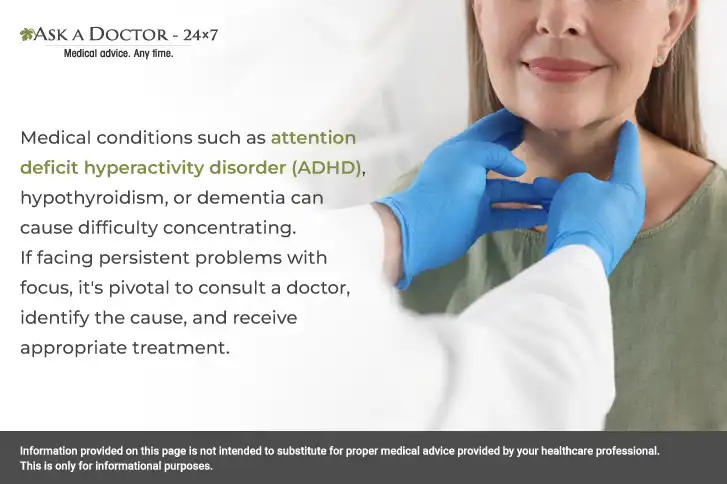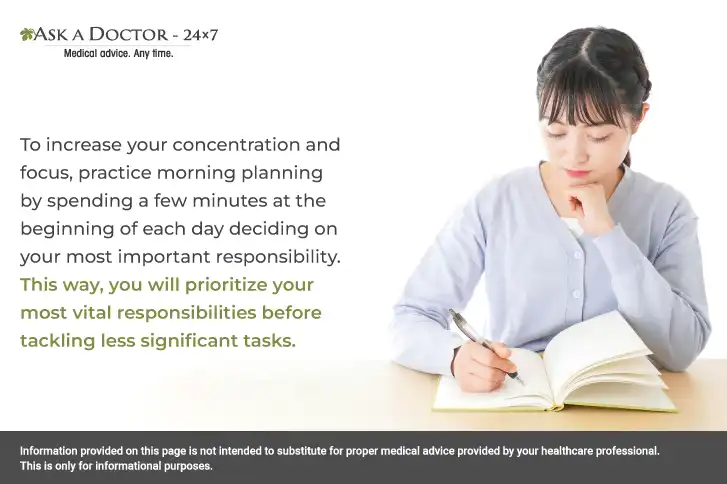Strategies To Improve Concentration And Focus At Any Age
Everyone has experienced being stranded at their desk with a tight deadline and a rushing mind. Despite your best efforts, we occasionally feel trapped and wonder how to focus or concentrate since we are unable to focus on the subject at hand. Nonetheless, the advantages of enhanced attention and concentration make it a topic worth addressing.
Being unable to concentrate is an issue in both children and adults and can affect people at any age. Lack of focus not only hampers performance at work or school but also at everyday tasks. In this blog, learn the causes of low focus and concentration and the six top strategies to manage them.
What is Focus & Concentration?
Focus is the ability to direct attention toward a specific task or objective, functioning as a mental spotlight, while concentration is the capacity to sustain that focused attention for a prolonged time, deeply engaging with the task at hand. Think of focus as choosing what to look at, and concentration as how long you can keep looking at that object.
What are the Reasons that Cause Poor Concentration?

The causes of poor focus and concentration are:
1. Distraction
We are continuously exposed to both internal factors (fatigue, stress, or negative emotions) and external factors (multitasking, social media, and disorganization) that cause distraction. It is important to note that poor sleep, a poor diet, and lack of exercise significantly impair cognitive function and make you more susceptible to distraction.
2. Cognitive issues
Your ability to pay attention may diminish if you have a propensity to forget things. You occasionally lose things, have trouble remembering recent events, and your memory fails you.
3. Effects on the mind (psychological effects)
When you are depressed and sad, it is difficult to focus. Likewise, if you're grieving or anxious, you may have trouble concentrating. This happens because high stress levels can flood the brain with cortisol, which diverts energy away from attention-controlling functions.
4. Environmental aspects
This includes unfavorable work dynamics, shared spaces, and bad working conditions (inadequate lighting, extreme temperatures, or a cluttered workspace), contributing to a lack of focus.
5. Lifestyle
Concentration can be affected by hunger, exhaustion, and dehydration. Additionally, eating too many high-calorie items or missing meals might strain our memory and ability to focus and concentrate.
6. Medication side-effects
Certain medications can reduce alertness or impact concentration.
Six Strategies that Help Improve Concentration and Focus

Here are the six must-know strategies to help improve concentration nd focus at any age:
1. Get enough sleep: Getting enough sleep is essential for cognitive function and can greatly enhance your focus. Make regular 7 to 8 hours of good-quality sleep a priority. For improving the quality of your sleep, you must:
- Turn off the television or other electronic devices for at least 30 minutes to an hour before sleep, as the blue light can interfere with sleep.
- Maintain a cool but pleasant temperature in your space. Additionally, before going to bed, unwind with a book, a relaxing bath, or soothing music.
- Develop a relaxing bedtime routine to help signal your brain and body that it's time to wind down. Ensure your bedroom is dark, quiet, cool, and comfortable.
- Follow a consistent sleep schedule even on the weekends to regulate your body's internal clock. Try to go to bed and wake up at roughly the same time every day.
- Try to avoid doing a strenuous workout right before bed, but exercise regularly.
- Avoid consuming caffeine, alcohol, and large meals close to bedtime.
2. Exercise regularly: Exercise improves blood flow to the brain, which supports mental health and concentration. Even quick strolls can have an impact.
3. Engage in meditation and mindfulness: Breathing exercises and meditation will help you stay in the “now” and gently refocus your thoughts when they stray. To train your attention, begin with a brief meditation or some mindful breathing techniques.
4. Establish a distraction-free zone: To help you stay focused, reduce outside distractions by shutting off notifications, removing social media, and arranging your workspace. Establish what deserves your full attention and create a list of tasks for the day.
5. Use time-management technique: Use the Pomodoro technique, which involves focusing for 25 minutes and then taking a 5-minute break, to help you stay concentrated and sustain your mental energy. If you plan to take strategic breaks from your work to stretch, walk around, or get a drink, it will not only refresh your mind but also prevent burnout.
6. Avoid multitasking: To improve concentration, focus on one activity at a time. Multitasking is actually a rapid task-switching, which slows you down and reduces the quality of your work. Instead, concentrate on one activity at a time and give each task your full attention before going on to the next.
Conclusion
People of all ages may experience difficulty focusing for a variety of reasons. Sleep deprivation, stress, medication effects, or a mood problem are all potential causes. Thyroid issues, OCD, ADHD, and other underlying disorders can also make it difficult to focus. If lifestyle modifications aren't resolving your concentration issues, you should consult your healthcare provider for a diagnosis and treatment planning.
If you have any questions related to concentration and focus improvement, consult a Psychologist at Ask a Doctor - 24x7. You can also connect with our psychiatrist for issues related to stress, lifestyle, and anxiety.
Recently Answered Questions Related to Concentration and Memory
- What Causes Mental Confusion And Short-Term Memory Loss In A Hashimoto's Patient?
- What Causes Poor Concentration, Anxiety, And Poor Memory After Treatment Of Staph Sepsis?
- How To Improve Memory And Perform Better Without Forgetting?
- What Causes Numbness In the Face And Loss Of Memory Post Gamma Knife Radiation?
- Memory Weakness, After Doing Masturbation. Will Memory Get Better After Stopping Masturbation?
- How To Get Rid Of Concussion Symptoms?
- Could Eye Floaters Be Related To Concussion?
Disclaimer: Information provided on this page is not intended to substitute for proper medical advice provided by your healthcare professional. This is only for informational purposes.
Ask a Specialist
Recent Questions


